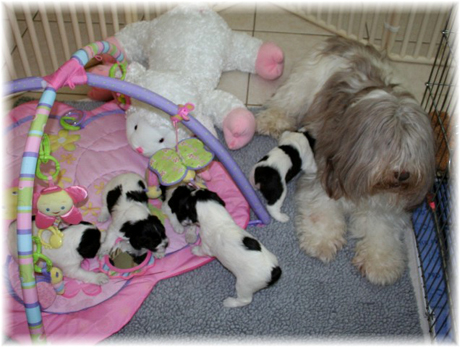
Polish Lowland Sheepdogs - pons - pon the dog

White Star Pons, Florida
Responsible PON Puppy Care
![]()
Your puppy is apt to feel stress because of the complete change in his environment. You can make him feel secure, and give him lots of love (cuddles) and plenty of time to adjust. The most visible effect of this stress will probably be an upset stomach. These symptoms are quite usual in sensitive intelligent PONS and will be observed in your puppy's normal playful behavior. If this does continue, take him or her to the vet. In any event, a vet's visit is advised for all new puppies.
It makes good sense to have your PON puppy microchipped
as a safety precaution, so that if it is lost or stolen, it can be scanned
and the puppy quickly returned to you. Chew toys provide excellent mental stimulation and help keep your PON's teeth clean and allow it to exercise it's jaws. Select toys for your PON carefully because some may be too small and some may splinter with excessive chewing. Your puppy needs a range of appropriate toys to play with in order to avoid chewing on furniture and other household items. Consider interactive toys such as balls on ropes and frisbees which are fun for both owners and PONS. Avoid allowing your puppy to play with sticks, golf or squash balls because they can easily become stuck in a puppy's throat and cause damage or even death. Please consult your breeder about grooming equipment and the best types of brushes and combs. You might wish to purchase a grooming table and start brushing your PON on it from an early age. Always brush your PON slowly and gently in order to introduce the concept of grooming in short sessions. If your puppy tries to bite the brush, consider some taste deterrent on it so the puppy learns not to bite the brush.
Tooth brushing is an important part of grooming and may help prevent gum disease. Start brushing early and use special canine toothpaste which comes in tasty flavors.
Generally speaking, puppies require considerably less exercise than adult PONS and great care needs to be taken to prevent overtiring puppies and preventing damaging young puppy joints. Exercise should take place on a daily basis and time spent playing in the yard is not a substitute for walks.
In summary, consult your breeder and vet for the best PON puppy care and use common sense when it comes to exercise, diet and socialization.
|
|||||||||